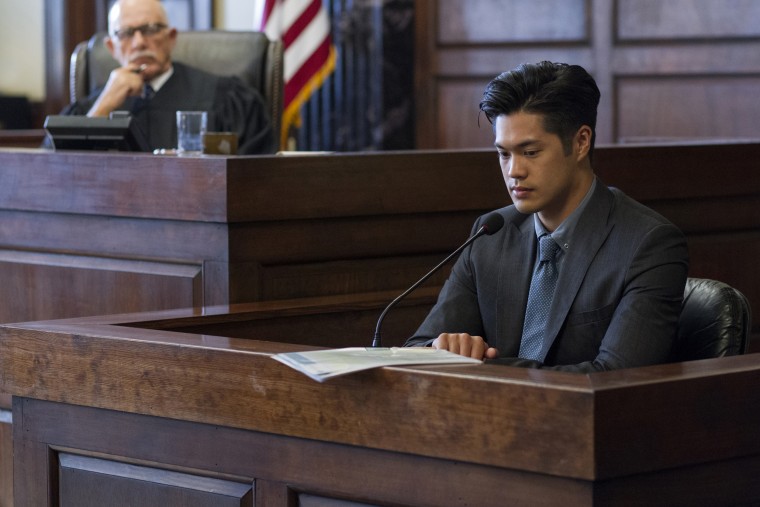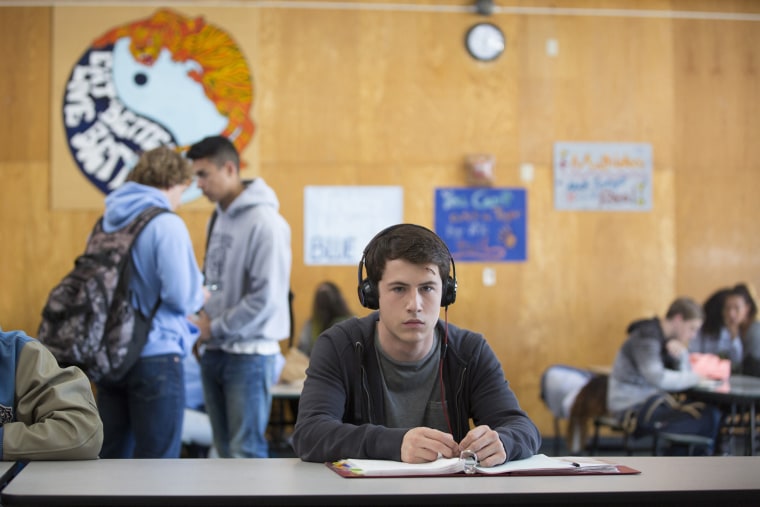The first season of the original Netflix series “13 Reasons Why” was met with critical praise but also a deluge of concern from mental health experts who feared that its graphic depiction of suicide could be dangerous for teens.
The show’s second season, which debuted Friday, revived those concerns and added new ones about a series that, in addition to suicide, explores substance abuse, gun violence and sexual assault.
Phyllis Alongi, clinical director of the Society for the Prevention of Teen Suicide, who has watched both seasons, said she found the show so disturbing that at times — particularly a scene in the new season in which a male student is raped in a bathroom — she had to look away.
“I do understand producers want to bring issues like this to forefront, but it was not necessary to be so graphic,” Alongi said, adding that the series has “touched on every single negative issue that there is that could involve teens.”
She fears the series could prompt suicidal thoughts in at-risk teens and encourage young adults to handle difficult matters on their own, as characters often do on the show.
The first season of “13 Reasons Why” focused on the suicide of a Liberty High School student, Hannah Baker, and unfolds through audio tapes listened to by her friend Clay Jensen. The series is based on the best-selling 2007 book of the same name by Jay Asher.
The first season included the graphic depiction of Hannah’s suicide, leaving many in the mental health field concerned that teens could see self-harm as part of “a revenge fantasy.”
With the release of the second season, experts, teachers and parents now have a new set of concerns. The second season focuses on how students are coping after Hannah’s death. The episodes are strung together through a civil trial brought by Hannah’s parents against her high school, but new plot lines emerge, including a thwarted school shooting. Netflix canceled its premiere party for the show after the school shooting Friday in Santa Fe, Texas, occurred just hours before, leaving 10 people dead.
The show’s handling of the school shooting scene, in the Season 2 finale, was particularly concerning to mental health experts. The main characters learn of the potential attack and decide to confront the student themselves rather than alert police.
“When someone has a gun, you don’t stay with the person and try to take gun away from them. You call the authorities,” Alongi said. “We have to teach our kids these are confidentialities they can’t keep. When something concerns you, even when it’s just intuition, you need to seek out help.”
Another plot point that concerned experts was the return of Hannah as a spirit that follows her friend Clay. Alongi said this can give teens the false idea that if they die by suicide, they may be able to watch how their friends and family respond.
“I don’t think that’s safe messaging,” Alongi said. “She was almost haunting Clay and giving him advice — to me it’s not positive.”
The reaction to Season 2 has been mixed. The show’s first season earned largely positive ratings from critics and viewers, but Season 2 debuted with a 37 percent critics score on Rotten Tomatoes. Schools have sent warnings to parents about the second season, and some viewers said on Twitter that they were disturbed by what they saw and didn’t feel the on-screen warnings were adequate.
Netflix has taken steps to add context to the issues addressed on the show, including a behind-the-scenes special that was released as part of the first season called “13 Reasons Why: Beyond the Reasons,” which had experts, producers and the cast dissecting difficult topics. The show also added more viewer warnings to the first season after criticism.
A study by Northwestern University’s Center on Media and Human Development on the impact of the show, commissioned by Netflix, found that many teens and young adults said the series helped them start conversations. The study recommended that the show make some changes, including having the actors step out of character to discuss the issues raised by the series.

The streaming service appears to have taken those suggestions for the second season, adding a pre-show PSA featuring the actors out of character, a downloadable “13 Reasons Why” discussion series with the actors, another “Beyond the Reasons,” more end-of-episode explanations of how to get help, and a PIN lock for parents who want to screen the series before their children watch.
“In developing these new resources, Netflix worked with a variety of organizations in multiple regions to provide their input and expertise on relevant topic areas presented in the series, including suicide, bullying, sexual assault, threats of harm, drug abuse and more,” Netflix said in a statement to NBC News.
Netflix did not specifically address whether the feedback from critics of Season 1 played a role in the additions to the show.
Dr. Victor Schwartz, chief medical officer of the JED Foundation, a teen suicide prevention nonprofit, who has watched the first season but not the second, found Netflix’s efforts encouraging. But he still has concerns.
“The problem is never the claim that last season was harmful for everyone,” Schwartz said. “Our primary concern was about that small group of vulnerable people,” who could be moved to think about suicide after watching.
Alongi was glad to see that Netflix added resources but said she still does not recommend that teens with depression or an anxiety disorder watch “13 Reasons Why.”
“If an adolescent is going to watch it, they should do so with a parent,” Alongi said. “It’s emotionally draining to watch and they need someone to process it with.”
If you or someone you know wants to speak with a mental health professional, call the National Suicide Prevention Lifeline at 1-800-273-8255.

